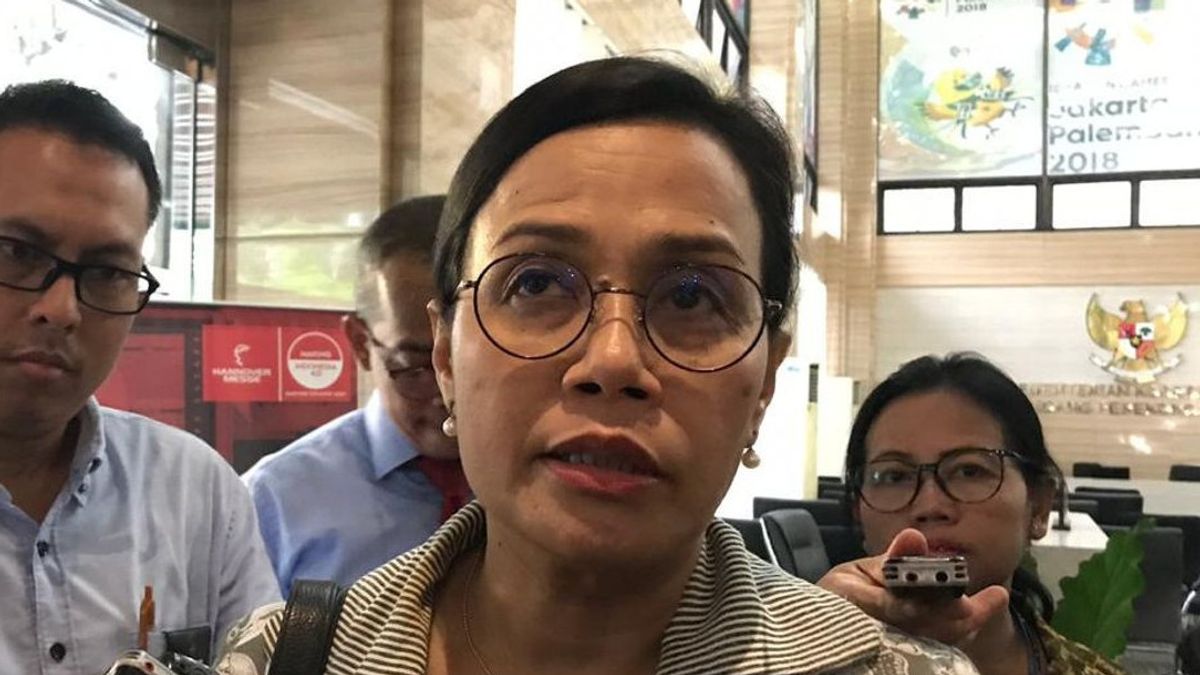JAKARTA - National economic recovery as a result of the corona virus pandemic or COVID-19, can only start at least from the last quarter of 2020 and the acceleration will be carried out in 2021. This is because the pressure of the COVID-19 outbreak on economic growth in the first and second quarters of 2020 is very heavy. .
Finance Minister Sri Mulyani Indrawati said that economic growth in the second quarter of 2020 in a tough scenario will approach zero percent. This happens if the COVID-19 virus pandemic lasts for a long time.
"Our economic growth for the second and third quarters will be very heavy. In our heavy scenario it will be at the point close to 0. And for the second quarter it will be close to 0 or maybe even negative. But in the third quarter we hope that it has started. recovery, "he said, in a written statement received by VOI, in Jakarta, Wednesday, April 15.
Sri Mulyani said, in the second quarter and three possible pressures were very big, namely, growth could approach 0 and 1.5 or negative at minus 2 percent and it is hoped that recovery will start in the last quarter of this year and this momentum will continue to accelerate in 2021.
Even so, the state treasurer is sure that economic growth in the third quarter of 2020 will be a recovery. So that the momentum is expected to continue to be accelerated in 2021.
"So earlier the answer is when the economy recovers. We hope that if we can manage the COVID-19 situation, especially on its socio-economic and financial impacts, the recovery will be able to run at least the last quarter of this year," he said.
According to Sri Mulyani, economic recovery will occur in 2021. In fact, he estimates that the economic situation in that year will return to 4.5 or even 5.5 percent. However, it will still be seen the situation in the second quarter and the speed with which COVID-19 is handled.
"So even today, if we make projections, we still have a lot of notes. However, we hope that the path is the third quarter and then the acceleration in the fourth quarter, especially the recovery can be seen more indications," he explained.
Prepare Short, Medium and Long Steps
With the implication of increasing the number of poverty and unemployment, Sri said, steps in the short, medium and long term cannot be separated. "In the short term, as conveyed by various ministers, instructions from the President, first we will increase the Pre-Employment Card from Rp. 10 trillion to Rp. 20 trillion. This could be absorbed by 5.6 million people affected by this layoff," he said.
However, said Sri Mulyani, this does not include BPJS Ketenagakerjaan which still has dues from companies that can be used to provide benefits to people who have been laid off, so in this case the safety net for workers is there.
For village funds, said Sri Mulyani, the Ministry of PUPR and ministries / institutions that have a budget are asked to undertake what is called cash for work or cash for work projects, especially from the Ministry of PUPR.
"The Minister of PUPR in this case has made an increase in the allocation in terms of creating so-called labor-intensive projects. For the housing sector, we have already upgraded the first facility," he explained.
According to Sri Mulyani, this budget reallocation is to create several labor-intensive projects in 1,000 locations. This means that in the short term, the Village Fund will be allocated in addition to social assistance (bansos), but also for labor-intensive activities.
The government, he continued, would use all existing instruments to be able to absorb negative impacts due to termination of employment (PHK) or reduction of employment opportunities with the current mechanism.
"In the medium (and) long term, we will remain focused on how to improve the resilience of the business world and even increase the attractiveness of the Indonesian economy," he said.
On the other hand, Sri Mulyani also reminded her to continue to focus on reforms and keep the impact of COVID-19 to a minimum. Because Indonesia can be considered as one of the countries that has the potential to attract investment or capital to improve the business world.
"Several steps, such as Japan will relocate its companies from China to other countries or from other countries, it also provides opportunities," he explained.
Sri Mulyani said that his party would take steps to keep the economy in good condition and be able to attract investment or make companies survive in a very tough situation.
"Nobody is not affected, but in this case those who are affected can survive a difficult situation. That is what we will continue to focus on. So the tax incentives we have said will be carried out," he said.
The government, said Sri Mulyani, is not only focused on the manufacturing industry, but has also added what is called tax incentives to 11 other sectors outside the manufacturing sector. Among other things, the transportation, hospitality, trade and other sectors that have been affected by COVID-19.
According to Sri, with this tax incentive, PPh Article 21, namely employee tax, accelerated VAT, corporate tax that is deducted for periodic payments of 30 percent, all are expected to provide resilience for companies in all 11 sectors that are considered to have a very negative impact. of the COVID-19 pandemic.
"By providing this stimulus, we hope that the ability of business sectors to survive can be increased," he said.
Another step in the long term, said Sri Mulyani, is the omnibus law and various reforms carried out with the aim that these sectors are not only able to survive, but also be able to attract new capital.
"This is what we will continue to fix later so that Indonesia will be able to pull back economic activities. And therefore poverty and unemployment can continue to be returned to the track of decline," he explained.
Transfers to Regions and Village Funds (TKDD) in 2020 also experienced a decline, due to state revenue which is projected to decline by around 10 percent. The TKDD deduction has also been conveyed by the Ministry of Home Affairs through a circular (SE) amounting to Rp94 trillion.
"We will do it carefully based on the situation as well as from the state finances, the state budget and the conditions of each region mentioned earlier, some have good fiscal capacity and some are very small," he said.
PAD is down
Sri Mulyani admitted, the central government understands that the regional government will face pressure from the Regional Original Revenue (PAD), which might decrease. For Java Island, it is much sharper, namely its PAD can drop up to 40 percent. Meanwhile, outside Java there will be less because the center of COVID-19 has hit very big in DKI.
According to Sri, DKI PAD might decrease by 50 percent and for provinces in Java Island, so it is seen that the PAD will be different.
"Earlier it was said that expenditures had to be adjusted. Earlier we said that for tukin expenditures, personnel expenditures, there are indeed regions that in a normal situation yesterday they had large revenues (compared to the central government)," he said.
Sri Mulyani said that the budget was obtained from PAD transfers, the conditions were good so that the regions could pay ASN-ASN in an extraordinarily high tukin. However, now in this situation it is expected to be able to lower at least the same as the center.
"Because it is indeed one of the posts that can be saved without causing the regional ASN to experience a very negative impact, because the central tukin is good enough," he said.
Regarding reallocation of regional funds, the Minister of Finance conveyed, it was still carried out from goods and capital expenditures, which even in a circular provides directions to save up to 50 percent on goods and capital expenditures.
"Of course this will be later in each APBD which depends on the fiscal capacity situation. We will see later. However, this is mainly to give instructions to the regions because we saw yesterday to today, there are still regions that are still hesitant to make adjustments. "This is the President's instruction to be really very specific," he explained.
With this savings, Sri said, not to reduce spending but to divert spending for health problems, social assistance and assistance from the business world. Thus, he said, mutual cooperation between centers that have added spending can be added to local governments.
Meanwhile, said Sri, for the regions of course, his party also carried out joint monitoring of the Ministry of Home Affairs regarding the consequences for those who did not do so. "We can postpone the transfer of DAU. So that means we are really serious now," he said.
Sri said the reason was because President Joko Widodo to this day still sees several areas that are still doing business as usual. Where, social spending does not increase, shopping for goods has not changed. So, it seems as if everything has not reached the regions that they need to make changes to their APBD.
PPE
Regarding the implications of the delivery of the COVID-19 pandemic national disaster, said Sri, the government, in this case the Ministry of Finance, together with other ministries / agencies and with the OJK are still seeing the consequences of this national disaster status.
Regarding foreign aid, said Sri, all these countries are now helping each other. There are those who provide in-kind assistance and Indonesia also helps in the sense that Indonesia is one of the largest PPE-producing countries in the world.
Sri said contracts with other countries would still be tried to be fulfilled without sacrificing the need for PPE in the country. Several talks have been held with South Korea and Japan. The goal is to be able on the one hand to fulfill PPE in the country, but also to meet the needs of other countries that do not have the industry to build or make PPE.
"Also for ventilators, which yesterday announced in the world that their property rights can be wave, this means opening up opportunities for industries to make ventilators in accordance with health specifications," he explained.
The English, Chinese, Japanese, Arabic, and French versions are automatically generated by the AI. So there may still be inaccuracies in translating, please always see Indonesian as our main language. (system supported by DigitalSiber.id)












